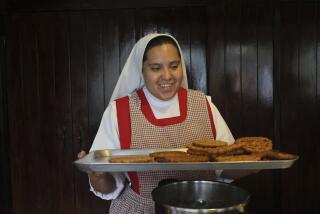First Order of Black Nuns Heeds Call for 165th Year : Catholicism: Oblate Sisters of Providence, founded to educate children excluded from segregated schools, have weathered adversity.
- Share via
BALTIMORE — As wintry light filters through the stained-glass windows of Mount Providence, several dozen nuns reaffirm their devotion. Wearing habits, veils and silver wedding bands, holding hymnals flavored with spirituals, the women appear joyful, serene and a bit mysterious.
On the wall behind the altar are words that have helped to define them: “Therefore Go and Teach All Nations.”
These women belong to the world’s first order of nuns of African heritage, the Oblate Sisters of Providence. Founded in Baltimore 165 years ago with a mission to teach “colored” children, the Oblate Sisters have served schools and orphanages in as many as 35 states. Now, as is the case in other religious orders, their numbers have dwindled and their members have aged. But their sense of purpose remains strong, bolstered by a history of forbearance.
The sisters have worshiped in basement chapels. They have weathered the animosity of white Catholics who objected to seeing black women in habits. They have survived periods in which church officials, pessimistic about their survival, advised them to “return to the world.”
One 69-year-old sacristan remembers the days when black nuns were permitted to take communion only after white communicants had finished.
The Oblate Sisters’ belief is rooted in the order’s extraordinary beginnings. In 1817, Elizabeth Lange, founder of the order, came to Baltimore from the Caribbean with two major handicaps: She was a free black woman in a slave state and a Catholic in what was then a predominantly Protestant city. Furthermore, she spoke only French.
At the time, Baltimore had become home to thousands of refugees from political upheavals in Santo Domingo and other islands. When the emigrants arrived, they found a segregated society where their children could not attend schools.
With the help of the Rev. James Joubert, a priest of the Sulpician order, Elizabeth Lange started a school that offered free education for black children. Next, she persuaded the Vatican to approve a convent to serve this mission.
When Rome officially recognized the Oblate Sisters of Providence as a religious order, it became the first within the Catholic church to devote itself to teaching black children. (The Latin root of “oblate” refers to someone who offers his or her life to some form of work.)
Over the next century, the Oblates opened and operated many schools around the country.
*
Today, 147 nuns carry on the work, and most of them live at the motherhouse. About half are foreign-born. The order has one white member, Sister John Francis Schilling, principal and president of St. Frances Academy in Baltimore. (The order’s founding rules state that the Oblate Sisters cannot turn away aspiring nuns because of race.) Fewer than 10 nuns are under 40, says Sister Claudina Sanz, the order’s superior general.
At Mount Providence, copies of Mother Lange’s portrait can be seen everywhere. The only existing photograph of the founder, taken when she was in her 90s, shows her to be a tiny woman with bright, piercing eyes. She looks wise, determined and, perhaps, a bit stubborn: She continued to speak French all her life even as she fought to expand her congregation in America.
Now her order is working hard to advance Mother Lange’s cause in the Catholic Church’s lengthy canonization process, a journey that began three years ago when the Vatican approved the campaign to make her a saint.
Sister John Francis Schilling first joined the order in 1967. Now 48, the white nun first visited a community of Oblates in Chicago with an African American friend who was interested in becoming a nun. Instead, it was Sister John Francis who decided to join the order.
“I was very taken by the sisters’ warmth,” she recalls. “I had been taught by religious all my life, but there was something different about the Oblates that appealed to me. They weren’t aloof, there was a warmth, a welcoming kind of acceptance.
“At first my parents did not feel I would be accepted in the African American community, but I’ve found it just to be the opposite. I’ve been accepted everywhere I’ve been.”
Typical of the Oblate nuns is Sister Claudina, 52, who grew up on the island of Belize, the sixth of eight children. She joined the order in 1961 and became its 17th superior general last June.
As a child, she was fascinated by the nuns who taught her, and she read as many books as she could find about convent life. She also participated in almost every extracurricular activity school offered.
Like many of the Oblate Sisters, she chose to join a black order because of the prejudice against black nuns throughout the church.
“For a while, they were one of only two communities who accepted applicants who were black,” says Baltimore Archbishop William Keeler. “But in the ‘60s, we all became conscious of the need for racial justice. Many other communities took a lead from (the Oblates) and opened up to people of different racial backgrounds.”
Sister Claudina says, “Even until the 1970s, many of the white orders did not accept black girls. I could have joined an order at home, but I would have been too close to my family and that would have been difficult. My spiritual adviser was a black man who told me to go to the Oblates because he understood the racism in the American church.”
There are two other primarily African American orders for women: the Holy Family in New Orleans and The Franciscan Handmaids of Mary in New York. Sister Claudina believes the black orders have brought important lessons about persistence and perseverance to the church.
“I think black Catholics in the United States have a lot to teach people in general about love of God and faith in God and that all humankind is one,” she says.
More to Read
Sign up for Essential California
The most important California stories and recommendations in your inbox every morning.
You may occasionally receive promotional content from the Los Angeles Times.













